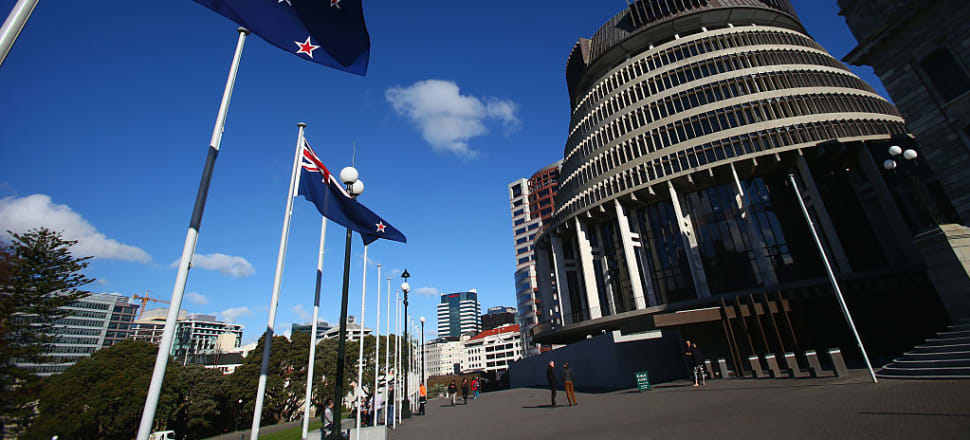
This year’s election marks the 30th anniversary of the referendum to change to the MMP voting system. Michael Swanson analyses the impact it has had and urges the next government to act on the 2023 Independent Electoral Review and make changes for the better.
Comment: In 1993, New Zealand chose to ditch first past the post (FPP) in favour of mixed-member proportional (MMP). As we close in on our tenth MMP election, we can look at some major lessons learned, how the face of politics has changed, and what comes next for MMP.
Coalitions (and the various forms they take) are the norm
Since 1996, coalitions (and similar arrangements) have become central to forming governments.
There have broadly been three types of arrangements – formal governing coalitions (Labour-NZ First 2017); confidence and supply agreements ensuring the Prime Minister-to-be has the confidence of a majority of MPs and support to pass the budget (National-Act 2008); and, support/cooperation agreements that create broader government support (Labour-Green 2020).
Under FPP, governments were effectively known on election night, but from 1996 the final governing arrangements have taken time to negotiate.
READ MORE:
* MMP system is complex and secretive
* MMP and my part in the downfall of First Past the Post
* Quarter of a century of our MMP voting system
* The MMP dilemma: are you the lap dog or the tail?
This is a shift away from the mindset of directly electing a government (even if they didn’t win the 'popular' vote) under FPP to electing a Parliament who are tasked with forming a government.
MMP has been good for representation
Under MMP, representation of women has grown significantly.
While the first woman entered Parliament in 1933, by 1993 only 21 percent of MPs were women.
MMP saw a sharp increase in 1996 to 29 percent, and by 2020, women made up almost half of all MPs (58 out of 120), reaching 50 percent in 2022.
A similar trend can be seen with ethnic representation.
In 1993, 8 percent of MPs were non-Pākehā and by 1996 this grew to 17 percent. Growth has continued upward since, with 21 percent of MPs Māori, 9 percent Pacific, and 9 percent other non-Pākehā groups in 2020.
It’s still hard to get new parties in Parliament
There are still no new parties in Parliament that don’t have links to representation through Labour and National.
From the late 80s, several new parties formed on the backs of former National or Labour MPs.
The earliest came in 1989 when Jim Anderton formed New Labour (and then the Alliance in 1991).
Other parties included New Zealand First (ex-National), United (ex-Labour), Act (both ex-Labour and ex-National), and the Green Party (which split from the Alliance for the 1999 election), followed by The Māori Party in 2004.
While a range of brand-new parties have emerged, none have really come close to the 5 percent threshold.
Several have gained profile and attention but have failed to make an impact on election day.
Enhancing MMP and the electoral system
The 1986 Royal Commission, the 2012 MMP Review, and the 2023 Independent Electoral Review all considered how to enhance MMP.
The 2023 review’s interim recommendations include modernising electoral laws, lowering the threshold to 3.5 percent, a referendum on a four-year parliamentary term, expansion of voter eligibility, electoral finance reform, and greater effort to uphold Te Tiriti o Waitangi.
The 5 percent threshold is higher than originally recommended.
The 1986 Royal Commission suggested 4 percent, as did the 2012 review, while the 2023 review so far opts for 3.5 percent.
The 2023 review notes two competing factors – appropriate representation of interests while maintaining stability for effective government.
The fine line between these considerations can have a significant impact on accessibility to Parliament and has likely resulted in several parties falling short due to the perception that voting for them would be a wasted vote.
Term length is a recurring consideration.
In 2020, Judith Collins and Jacinda Ardern were asked about terms and both agreed they supported four-year terms.
The argument for a four-year term centres on three years not being long enough to enact change, while the case against argues three years ensures greater accountability.
The 2023 review’s suggestion to hold a referendum would be a chance to tackle this head on.
Party finance is always contentious
Discourse centres around the right to financially support the party of your choice versus managing the issues of undue influence (real or perceived).
Changes made by the current Labour Government lowered thresholds for reporting contributions, but there are broader questions around contribution limits, and rules outside of the official election period to be addressed.
Pushback against changes often cite the need for greater checks and balances.
Suggestions include an upper house, more referendums (particularly binding), and a greater use of direct democracy.
Select committee arrangements could also be reviewed to ensure effectiveness and areas for improvement.
What happens next?
The 2023 review is expected to provide their its report to the Minister of Justice in November – after which it is up to the government to determine how to proceed, with many recommendations then requiring legislative processes to be started.
It is important the current review doesn’t suffer the same fate of the 2012 review where no further action was taken.
Unfortunately, accepted recommendations might be years away from implementation.
Referenda held separate to elections have notably lower turnout than those held alongside elections, so the likelihood of referendum prior to 2026 is low.
Unless the next government progresses without referendum, actual change won’t be in place until the 2029 election.
Whoever forms government after October 14 has the opportunity to pick up the outcomes of the 2023 Independent Electoral Review and make substantial changes to the way MMP functions. Confidence, however, in any significant change is low unless we have politicians who seek to improve the system, rather than reinforce their own positions.







